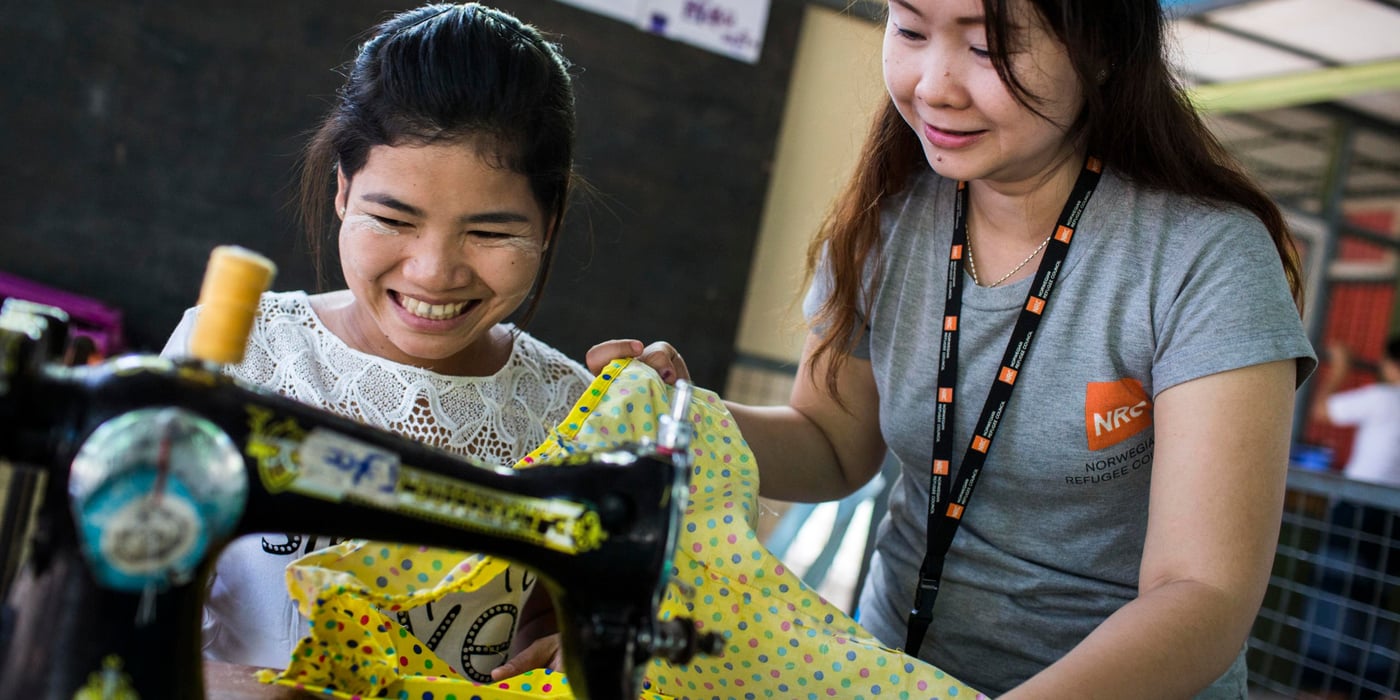
Employment opportunities at NRC
- NRC field staff – local and international - Ninety per cent of our staff are national employees and many were themselves once forcibly displaced. This gives us unique insight into the environments where we work. NRC hires international staff for field programmes when circumstances or the requirements of the job justify it.
- NORCAP experts - NORCAP is our global provider of emergency expertise, with around 1,000 experts ready to deploy at a moment's notice to assist in humanitarian crises. Our NORCAP staff are deployed on time-limited contracts to local, national and international partners working with the humanitarian, development and peacebuilding sectors.
- Staff in NRC's Head Office and Representative Offices - Our Head Office is located in Oslo. We have representative offices in Brussels, Geneva, Berlin, Washington DC and Addis Ababa. From these locations we support, coordinate and manage the global strategy for NRC's operations.
Volunteers? We are unable to accept volunteers in our programme countries, as we are limited by safety and insurance regulations.
Internships? We offer internships at our Head Office in Oslo as well as at some of our country and regional offices. All internships are hired locally (for security and insurance reasons). At Head Office, internships are only available through our partnering schools and therefore may not be listed on our website.
Trainees? We do not currently have a global trainee programme.
Profiles and backgrounds we are looking for
Relevant experience, appropriate education
In recruiting, we focus very much on candidates who have the relevant experience. The required qualifications will always be mentioned in the job offer. We will specify the education level certifications or diplomas that are appropriate for the job and the location.
English is our working language, and fluency expectations grow with the increasing responsibility of the position. For some locations, fluency in Arabic, French or Spanish is required.
Most positions require a willingness to travel to the field.
Please be aware that applications that do not meet the minimum standards in terms of experience or qualifications will generally not be considered. Unsolicited applications not related to a specific job advertisement will likewise not be considered.
Reliable, participative and resilient personalities
We will pay attention to your ability to:
- think through the situations you may face
- remain positive, looking for and imagining solutions
- take the initiative while respecting procedures and decisions
- relate easily to colleagues, people we help and management
- speak your mind while staying curious and open to others's ideas
- be committed to going the extra mile when needed, while also being aware of your own stress levels and taking care to stay resourceful and flexible
Empowering leaders, achieving through others
We are looking for knowledgeable, accountable and empowering leaders:
- who can set the course in unexpected situations, while also taking care of their staff
- consult, create, trust and have the ability to influence different stakeholders
- with the empathy required for doing humanitarian work and for taking care of staff in stressful situations
- who can engage, support and develop their team to achieve positive results for the people we help
You may already be such a leader or have the desire and potential to grow into one.
Humanitarians who share our values
NRC strives to be dedicated, inclusive, innovative and accountable. To see if you are good fit, read more about our values.
The Norwegian Refugee Council's guiding principles
Code of Conduct - a binding engagement
The NRC Code of Conduct is an integral part of our employment contract and applies to all staff working for or representing NRC. We recognise that our work often puts staff in positions of power in relation to both colleagues and the people we help. Staff have an obligation not to abuse this power.
The Code of Conduct is intended to serve as a guide for all staff in how to uphold the ethical foundation of the organisation’s views and actions. It also aims to help staff to ensure that we protect the communities we work with and that our work does not put the people of concern at greater risk. Read NRC's Code of Conduct here.
- We are NRC ambassadors: As an employee of NRC, you are an ambassador for the organisation and will be seen as the organisation's representative, both during and outside working hours. Your ability to uphold and promote the highest standards of ethical and professional conduct will ensure the success of our mission to protect and assist displaced people.
- A code grounded in humanitarian standards: The NRC Code of Conduct covers humanitarian and ethical topics such as respect and dignity, abuse of power, conflicts of interest, discrimination, corruption, harassment, sexual exploitation and abuse, safety, and responsible communication.
- A behavioural guide: Our Code of Conduct should serve as a guide for all staff in their professional lives, and at times also in their private lives. It formalises the attitudes and actions that uphold NRC's ethical foundation.
Duty of Care
In accordance with NRC's duty to take reasonable steps to protect staff, we have identified seven principles to follow.
Safety, security and health are an absolute priority at NRC. As our programmes throughout the world operate in risk areas, it is essential for NRC to take whatever reasonable steps we can to protect our staff from both physical and psychological harm. This includes among others:
- providing a secure, safe and healthy working environment in the field
- having systems and procedures in place to ensure such an environment
- briefing, training and supporting staff
- preparing for possible emergencies
Risk cannot be avoided in our field of work. NRC recognises that balancing risk management with the humanitarian imperative is often a dilemma. It’s important to acknowledge that not every possible risk can be avoided or eliminated in the difficult areas where we work. As an NRC employee, you must be aware of the risks that a job like this entails and evaluate whether you are ready to accept them.
Duty of care is a shared responsibility. In the field, all NRC staff take an active role in applying duty of care standards:
- NRC managers take responsibility for following up on their teams: assessing risks, providing training and information, supporting employees, ensuring appropriate equipment is available, monitoring experiences and acting on feedback.
- NRC employees commit to: being aware of existing risks and threats, complying with procedures, understanding the cultural and political environment, preparing for emergencies, reporting issues that may jeopardise safety and raising concerns.
Staff respect of security policies and systems is non-negotiable.
NRC values
NRC is driven by four core values.
- Dedicated: Being dedicated means identifying with and being wholly committed to NRC's vision, mission, strategies and values. It means being willing to put displaced people first.
- Inclusive: Being inclusive means genuinely involving relevant actors and staff who may be affected by our decisions.
- Innovative: Being innovative means staying open to new directions and being proactive in balancing opportunities and risks.
- Accountable: Being accountable means adhering to what we have committed to do and being able to account for our actions.




